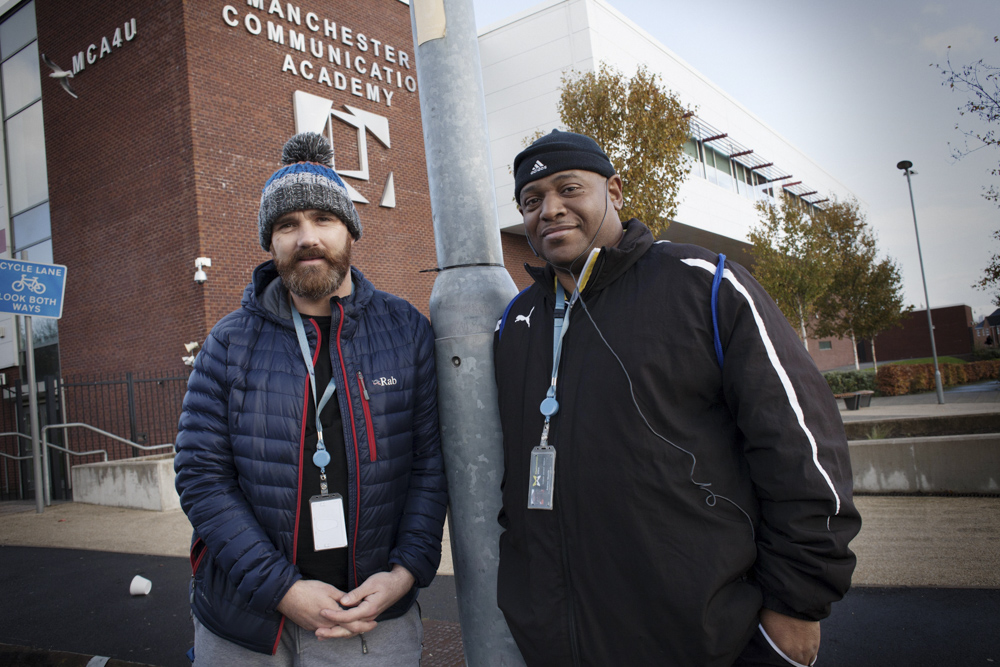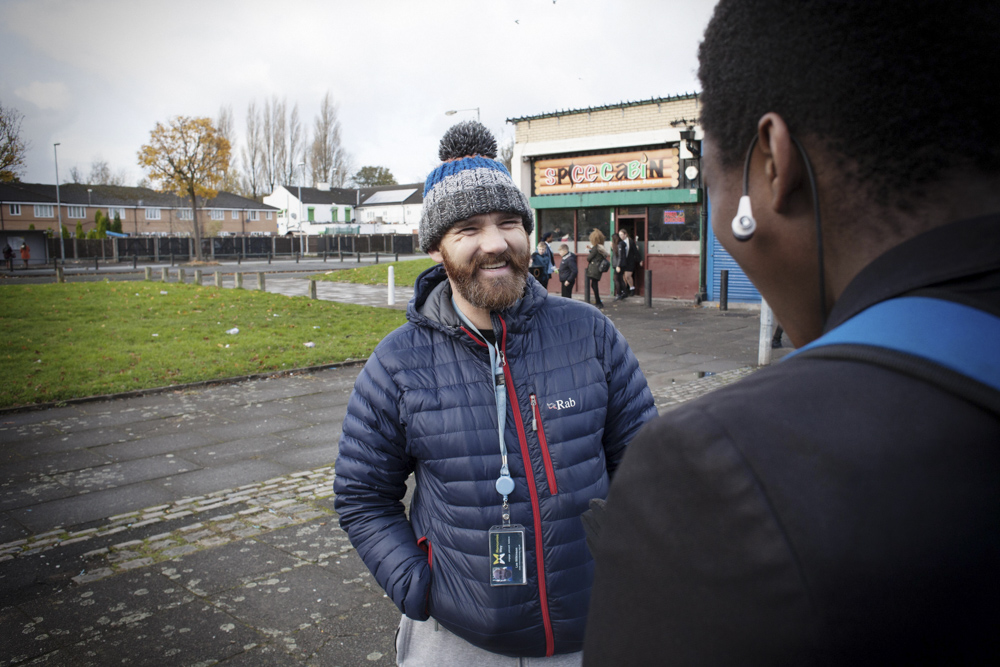It’s lunchtime on a chilly Friday afternoon and I’m outside a north Manchester high school as excited students stream out, finished for the week.
Amongst the mums, dads and carers are Lee and Adrian, two workers from the Mancunian Way youth charity, about to start their afternoon shift.
 “So what’s the idea?” I ask as the children disperse in all directions.
“So what’s the idea?” I ask as the children disperse in all directions.
“The main aim is to tackle anti-social behaviour,” says Lee. “In a little while we’ll head up to the takeaway where they have their dinners. Then we’ll make our way around the estate.”
Lee and Adrian are part of the charity’s Stay Safe programme funded – in this part of the city at least – by Forever Manchester’s Fourteen programme.
It’s a street-based scheme where, over time, youth workers build trust with local young people in targeted areas so they can offer advice and support when it’s needed. As well as their Friday afternoon shift, Lee and Adrian are out on these streets on Tuesday evenings too.
“To be fair most of the issues we deal with are not from students of this school,” explains Adrian as we walk towards the takeaway, “but with local kids who’ve been excluded. Even trying to hold a conversation is difficult, they only want to talk about criminality. All they’re interested in is making money in the wrong way rather than staying in school.
“Many of the young people who are antisocial don’t have a strong support structure at home,” he continues. “Maybe there’s a parent who’s alcoholic, or in prison. So there are no boundaries.
“They’re a victim of their environment?” I suggest.
“The parents aren’t bothered. The kids can do what they want.”
The takeaway is the only shop open in a row of shuttered properties in a derelict square.
I’m introduced to Paul, a 14-year-old student from the high school, who’s already eaten and is on his way home.
 “He plays in goal for Stoke City,” says Lee by way of introduction, “and you’ve just been selected to play for England Under 15s, haven’t you?”
“He plays in goal for Stoke City,” says Lee by way of introduction, “and you’ve just been selected to play for England Under 15s, haven’t you?”
Paul tells me how he was trialled by the Premiership club and now travels there three times a week for training. “So what have these two ever done for you?” I ask him, cheekily.
“No pressure now,” jokes Lee, over my shoulder.
“They’ve given me lots of encouragement,” says Paul, “they tell me to keep striving forward.”
 The takeaway is full to bursting with more young people forcing their way in to order their box of chicken or cone of chips. Two young lads, not in school uniform, come out and are greeted by Lee and Adrian. Their reply is not so polite.
The takeaway is full to bursting with more young people forcing their way in to order their box of chicken or cone of chips. Two young lads, not in school uniform, come out and are greeted by Lee and Adrian. Their reply is not so polite.
After they’ve disappeared back into the estate Adrian explains they have recently been excluded and now attend a Pupil Referral Unit. “Sometimes you’ll get some sense out of them and sometimes you won’t,” he says, “but they’re always suspicious of new people.”
“That’s understandable,” I say. “It must be reassuring though for these youngsters to have you around.”
“They get used to seeing us,” says Lee. “We’re here week in, week out. Everyone knows why we are here. And every week we speak to someone new.”
We wander towards the 3G football pitches where small groups are running after each other, burning off energy, being kids.
 “If you had the resources,” I ask, “what would you like to see happen for young people?”
“If you had the resources,” I ask, “what would you like to see happen for young people?”
“Getting them out of their comfort zones can be really inspiring,” says Lee. “Many of these,” he waves an arm, “have never left their own patch. Experiencing the outdoors can be especially rewarding.”
“You’ve got to give young people hope,” adds Adrian. “There has to be real opportunities for them. Without hope they will turn to alternative negative activities. So tackling the lack of provision for young people is crucial.”